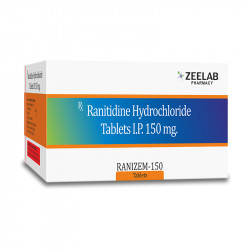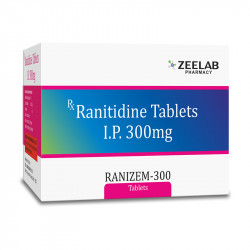Ranitidine
Ranitidine is a medication that helps reduce stomach acid production. It is commonly used to treat conditions such as acid reflux, heartburn, and stomach ulcers. By lowering acid levels in the stomach, it provides relief from discomfort and prevents complications like esophageal damage. Ranitidine belongs to a class of drugs called H2 blockers, which work by blocking histamine receptors in the stomach lining. This medication was widely used until it was recalled in some countries due to concerns about potential impurities. However, it remains a well-known treatment for acid-related conditions.
Uses of Ranitidine
- Treats acid reflux and gastroesophageal reflux disease (GERD)
- Relieves heartburn and indigestion
- Heals and prevents stomach and intestinal ulcers
- Reduces stomach acid production in Zollinger-Ellison syndrome
- Prevents acid-related damage to the esophagus
How Ranitidine Works
Ranitidine works by blocking histamine H2 receptors in the stomach lining. This action reduces the production of stomach acid, providing relief from conditions like acid reflux and ulcers. By decreasing acid levels, it helps heal the digestive tract and prevents further irritation or damage.
Benefits of Ranitidine
- Effectively reduces stomach acid production
- Provides quick relief from heartburn and indigestion
- Aids in healing stomach and intestinal ulcers
- Prevents acid damage in the esophagus
- Helps manage chronic acid reflux symptoms
How to Take Ranitidine
Ranitidine is usually taken orally with or without food, as directed by a doctor. The dosage depends on the patient’s condition and response to treatment. It is often taken once or twice daily, with or without meals. Avoid taking it with alcohol or foods that trigger acid reflux.
Types of Dosage Available
- Ranitidine 75 mg tablets
- Ranitidine 150 mg tablets
- Ranitidine 300 mg tablets
- Ranitidine oral syrup
- Ranitidine injection
Side Effects of Ranitidine
- Common side effects: headache, nausea, and dizziness
- Stomach pain or constipation
- Allergic reactions like rash or swelling
- Rare but serious effects: liver issues, irregular heartbeat
- Long-term use may increase the risk of vitamin B12 deficiency
Safety Advice
- Do not use if allergic to Ranitidine or similar medicines
- Consult a doctor before use if pregnant or breastfeeding
- Monitor for unusual fatigue or yellowing of the skin
- Avoid alcohol and smoking, as they worsen acid reflux
- Inform the doctor about any existing liver or kidney issues
Frequently Asked Questions (FAQs)
Q: Is Ranitidine still available for use?
A. Ranitidine has been recalled in some countries due to safety concerns, but alternatives are available.
Q: How long does it take for Ranitidine to work?
A. It usually starts working within 30 minutes, providing quick relief from acid reflux.
Q: Can I take Ranitidine daily?
A. Yes, but only as directed by a doctor. Long-term use should be monitored.
Q: Does Ranitidine cause drowsiness?
A. Drowsiness is not a common side effect, but some people may experience dizziness.
Q: Can I take Ranitidine with other medications?
A. Consult a doctor before combining it with other drugs, especially antacids or blood thinners.
Download India's most affordable pharmacy app
- Compare with medicine prices
- Save upto 90% on your medicine bills

Temperature Controlled storage and delivery

Regular Sanitization

Disinfected Packaging
















 Added!
Added!